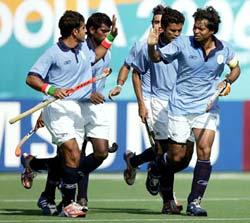|
|
| Help | |
| You are here: Rediff Home » India » Sports » Column » Carmo D'Cruz, Ashok Pandit, Muzaffar Shaikh and Balbir Singh Sr |
|
| |||||||||||||||||||||||
|
| |||||||||||||||||||||||
Field hockey has long been the popular team sport in India in which the country has won eight Olympic gold medals in the last century. In the last few years, the country has not been doing too well in international tournaments as well as the Olympic Games or the World Cup.
In this abstract, the authors outline their plans to rejuvenate and revitalise hockey in India using the latest the latest systems engineering principles to revolutionise the game from an art form to a highly effective scientific approach.
In these days of India dominating the world of software engineering, it is time that a related concept of systems engineering was used to get India back to the top of world hockey.
Our goal for this research is very clear: To use systems engineering principles to revitalise Indian hockey and get India back to the top of world hockey rankings.
Our objectives are: To help India win the 2008 Beijing [Images] Olympics [Images] gold medal and the 2010 World Cup by big margins (greater than 2-0) in the pool matches, semi-final or final for these major tournaments.
We will play attacking hockey. We will stick to our 5-3-2-1 attacking formation. We will have a psychological advantage over all the countries whenever we step on the field and this will mean that the game is already won psychologically before it has started.
However, we will use the goalkeeper not only as the last in the line of defense, but also as the first in the line of offense. This will enable a full-back to be freed for man-to-man marking.
Our customers are the Indian public and the Indian Hockey Federation.
 The Systems Engineering (SE) effort spans the whole system lifecycle. SE focuses on defining customer needs and required functionality early in the development cycle, documenting requirements, then proceeding with design synthesis and system validation while considering the complete problem.
The Systems Engineering (SE) effort spans the whole system lifecycle. SE focuses on defining customer needs and required functionality early in the development cycle, documenting requirements, then proceeding with design synthesis and system validation while considering the complete problem.
Systems integration for us will mean:
1) Integrating HW (Physical Fitness) with SW (systems, strategies and techniques);
2) Integrating Offense and Defense;
3) Integrating the goal keeper, full backs, half back and forwards into a smooth functioning, well oiled machine.
Other SE aspects of our mission:
1. Cost and schedule: Yes, we have to adhere to the cost and schedule. No exorbitant tours of Europe (just to play Belgium and set false expectations) or elsewhere. We should give our coaches ample time to prepare the team -- not three months like was given to Vasudevan Bhaskaran this time). The IHF should have a fixed calendar every year -- so every knows where to be and what to expect.
2. Environment: A national ranking system should be implemented so players know where they are on the ranking systems at state and national levels, at junior and senior levels at all times and there are no surprise inclusions or omissions at the last moment.
3. Design and development: We should design and develop our hardware (Physical fitness and conditioning) and software (Systems, Techniques and Strategies) to achieve our goals and objectives. We strongly recommend that altitude training should be a requirement for the Indian national team.
4. Information assurance: We should have up-to-date information on the latest developments in hockey and other sports in the world and the latest findings in the areas of conditioning, physical fitness, et cetera.
5. Tournament participation and deployment: We should use a 'Systems Life-Cycle Approach' to deployment of our teams - they should only participate in prominent tournaments (like World Cup or Olympics when they are at their peak performance. The teams should always play together (for better integration).
6. Performance engineering: All the latest techniques and strategies should be resorted to and the performance engineering departments of NIS, IHF, etc, should be staffed with foreign trained Indians especially from East Germany [Images], West Germany and the United States.
7. Training: Balbir Singh Sr's new book The Golden Yardstick on objective training techniques will be used as the bible for hockey training. We will also integrate latest developments by US-based German coach Jurgen Klinsmann et al on their latest developments in soccer and related team sports.
8. Operations and maintenance: We will suggest a sustainable approach to a national field hockey program with a long term outlook.
9. Test and evaluation: We will recommend the development of a video game to develop game intelligence in field hockey, encourage simulation plays of our new strategies and also popularise the game through other media.
10. System disposal: We need to have a continuous regenerative system -- our former hockey players should not be discarded after a major tournament or at the end of the team's life-cycle -- they should be recycled as coaches, umpires, selectors, etc.
Now to re-cap, our goal for this research should be very clear to every Indian and should confuse the hell out of our rivals: To use systems engineering principles to revitalise Indian hockey and get India back to the top of the world hockey rankings.
Florida-based Carmo A. D'Cruz is an IIT-Kharagpur graduate; Dr Ashok Pandit is a graduate from IIT-Kanpur; Dr Muzaffar Shaikh is from Bombay University; and Balbir Singh Sr is three-time Olympic gold medallist and manager of the only Indian team to win the 1975 World Cup.
|
|
| © 2008 Rediff.com India Limited. All Rights Reserved. Disclaimer | Feedback |